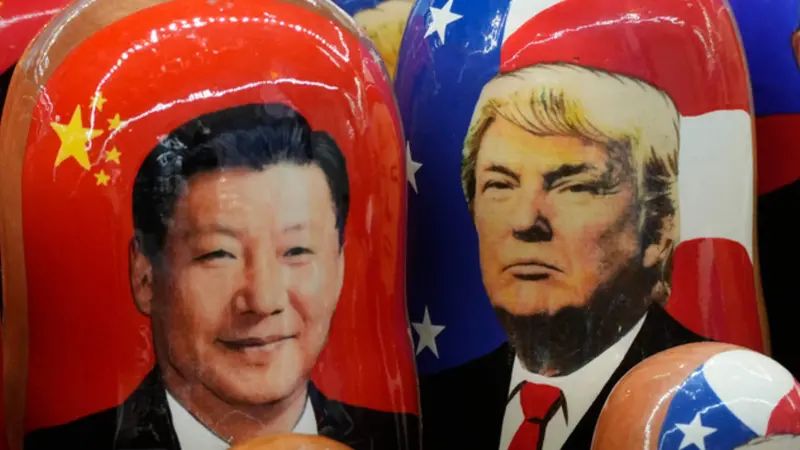
BEIJING: China’s relationships with countries such as Japan, India, and other nations that former U.S. President Joe Biden sought to ally with are beginning to improve, just as Donald Trump reclaims the presidency with his more unilateral approach to foreign policy.
The change in Washington’s leadership, which took effect on Monday, offers China an opportunity to adjust its diplomatic strategies. For years, Beijing has criticized Biden’s efforts to form alliances with “like-minded countries” aimed at countering China’s growing influence.
During his presidency, Biden revitalized the Quad alliance, which includes the United States, India, Japan, and Australia. However, China’s relationships with these U.S. allies, along with the U.K., are showing signs of improvement, casting doubt on the durability of Biden’s diplomatic legacy. Trump’s first term was marked by his willingness to challenge traditional U.S. partners.
“It’s possible that Trump’s distancing from U.S. allies could make them more attentive to China’s role, creating opportunities for Chinese diplomacy,” said Wu Xinbo, dean of the Institute of International Studies at Fudan University in Shanghai. “This is a chance China should seize.”
However, U.S. National Security Council spokesperson Brian Hughes countered that Trump “has a track record of rallying global efforts to adopt a competitive stance toward China.” He pointed to Trump’s endorsement of Japan’s Free and Open Indo-Pacific strategy during his first term and his push to exclude Chinese companies from telecom networks in the U.S. and allied countries.
On Tuesday, Secretary of State Marco Rubio met with the foreign ministers of Australia, India, and Japan in Washington just hours after being sworn in, signaling that engagement with the Quad to counter China will remain a priority under Trump.
China’s Diplomatic Efforts Have Limits
While China is attempting to repair relations with the U.K. and Japan, significant challenges and unresolved issues persist that could hinder progress.
India, for instance, moved forward from a bitter border dispute with China last October but strongly protested Beijing’s decision to establish two new counties in a contested area.
Meanwhile, new leaders in countries like Australia, the U.K., and Japan are demonstrating a willingness to improve ties with China, recognizing its role as the world’s largest manufacturer and a critical source of strategic minerals. Beijing, in turn, is seeking to attract foreign investment to revive its slowing economy, which could face further setbacks if Trump implements his proposed higher tariffs.
Chinese President Xi Jinping recently conveyed to European Council President Antonio Costa during a phone call that closer China-Europe ties could provide “stability and certainty” in a turbulent global landscape. This sentiment was reflected in the resumption of economic and financial discussions between China and the U.K. after a six-year hiatus, following a visit by the British Treasury chief to Beijing.
“From China’s perspective, improving relations with U.S. allies and enhancing economic cooperation can help mitigate the impact of strained China-U.S. economic relations,” Wu noted.
Trump’s Approach Rattles U.S. Allies
In Washington, there is a bipartisan agreement that the U.S. must maintain its edge in the economic and technological rivalry with China to preserve its global leadership.
During his confirmation hearing, Secretary of State Rubio described China as “the most potent and dangerous near-peer adversary this nation has ever confronted.” While Biden upheld tariffs imposed by Trump on Chinese goods, including electric vehicles and solar panels, Trump’s return has brought renewed uncertainty for U.S. allies.
Trump’s controversial statements—such as suggesting annexation of Greenland, an autonomous Danish territory, and incorporating Canada as the 51st U.S. state—have unsettled traditional U.S. partners. According to Hal Brands, a senior fellow at the American Enterprise Institute, Beijing’s strategists are “salivating” at the potential damage Trump’s policies could cause to U.S. alliances, creating opportunities for China to strengthen its ties with advanced democracies like Japan and European nations.
Sun Yun, director of the China program at the Stimson Center in Washington, noted that Trump’s rhetoric, combined with Elon Musk’s alleged interference in British and German politics, “will undoubtedly have ripple effects.” She added, “Countries may want to keep their options open. While China is unlikely to replace the U.S. as a preferred ally, even under Trump, nations may seek a counterbalance.”
Philippines Resists China’s Advances
Not all U.S. allies are mending fences with Beijing. The Philippines, under President Ferdinand Marcos Jr., has taken a firm stance against China’s assertiveness in territorial disputes in the South China Sea. Recently, the Philippines criticized the presence of a “monster” Chinese coast guard ship in contested waters.
In response, the foreign ministers of Japan and the Philippines recently emphasized the importance of U.S. engagement in the region during discussions with Trump.
A Shifting Diplomatic Landscape
The uncertainty surrounding Trump’s policies has prompted countries like Japan to seek a stable relationship with China. A Japanese foreign minister visited Beijing last month for the first time in seven years, and Chinese military officials traveled to Tokyo to resume defense exchanges after a five-year gap.
“This is, in some ways, a ‘Trump effect,’” said Taizo Miyagi, a Japanese diplomacy expert at Chuo University. “Many countries are likely thinking along similar lines, which could energize their diplomatic efforts.”
